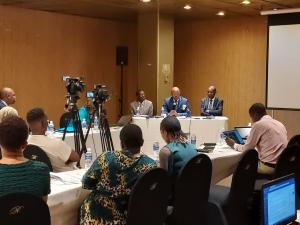Zimbabwe Takes Bold Steps to Combat Neglected Tropical Diseases
Neglected Tropical Diseases (NTDs), often overshadowed by limited funding and media attention, continue to inflict severe suffering on communities, especially women and children. This persistent neglect perpetuates a cycle of poverty, disease, and disability.
Addressing this issue demands a comprehensive strategy that encompasses prevention, treatment, collaboration, and active community involvement, as highlighted by Dr. Aspect Maunganidze, the Health and Child Care Permanent Secretary for Zimbabwe.
Dr. Maunganidze stressed the importance of increased investment in prevention, aiming for improved education, health, and employment outcomes for those at risk. He stated, “Prevention is key to disease control, and we have conducted mass drug administration over the years to prevent NTDs.”
Acknowledging the significance of community engagement, he added, “As a Ministry, we recognize the importance of engaging communities in the fight against NTDs. Government is committed to driving research and innovation in NTD control, collaborating with research institutes in the country.”
To address these challenges, the Ministry of Health and Child Care, with support from Higher Life Foundation and the World Health Organization (WHO), organized a media engagement workshop in Harare from November 6-10, 2023. The workshop aimed to share the latest information on NTDs programming in Zimbabwe.
NTDs affect millions globally, posing a substantial threat to global health. Zimbabwe is endemic to several NTDs, including bilharzia, intestinal worms, elephantiasis, blinding trachoma, rabies, leprosy, sleeping sickness, anthrax, plague, snakebite envenoming, Cysticercosis (Taeniasis), and Foodborne trematodes infections (clonorchiasis, fascioliasis, and opisthorchiasis). Bilharzia, intestinal worms, elephantiasis, and blinding trachoma are the top four common NTDs in the country.
A comprehensive approach is necessary, focusing on prevention, treatment, research, and community engagement. Prevention strategies include vector control, improved access to clean water, sanitation and hygiene practices, and health education. Effective treatment and strengthening healthcare systems are crucial for those already affected.
Community engagement is vital, empowering communities through education, awareness campaigns, and local leadership involvement. WHO and other international organizations have launched initiatives like the Expanded Special Project for Elimination of Neglected Tropical Diseases (ESPEN) and the WHO Neglected Tropical Disease global roadmap 2021—2030 to accelerate progress and reduce the burden of NTDs globally.
The roadmap encourages governments to provide leadership and commit to achieving global and national targets, aligning efforts toward a future free from the devastating impact of Neglected Tropical Diseases.
Source: WHO Zimbabwe



